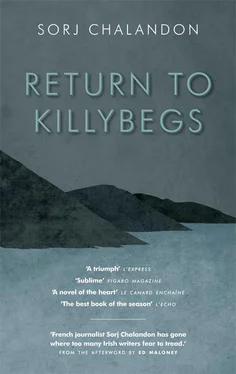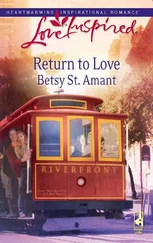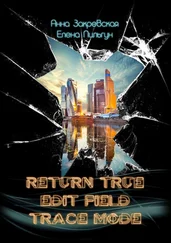— Where’s our flag? Jack asked.
He was trying to catch his mother’s eye in the rear-view mirror.
— All of that for this?
Sheila murmured. The peace process, the negotiations, compromises. Our flag would soon fly freely. The important thing was that our children be set free and their fathers stop dying.
Jack looked at me. I kept staring at the road. All of that for this? I responded that it was a beginning. Everything had to have a beginning. There were no more armoured patrols on our streets, no more raids, no more checkpoints. The British were dismantling their barracks, and their watchtowers on the border. The police were putting parking tickets on badly parked cars on the Falls Road. Did he understand? Those slips under the windscreen wipers, like in London or Liverpool. And did he know that Jacky Nolan, John McIntyre, his pals from school, had joined the police? It’s not only Protestants any more, Catholics can wear that uniform, too. And that, well, that changes everything, didn’t he think? He raised his hand, asked me to be quiet.
For a long time Jack ate with his back to us, facing the wall. He found sitting down to a meal obscene. He had spent nine years in solitary confinement. He talked to himself at first. His movements were more limited than they had been. In his room, he put the mattress on the floor. He tried to build a life with Fiona, a childhood friend. Then with Lucy. Then with us. He came back to the house at forty-seven years of age. A lookout, then a Fianna, óglach , lieutenant, captain of the Irish Republican Army, and today he is a night porter in a Belfast pub. He separates drunken kids who ask him who he thinks he is. Who remind him that the IRA is no longer around to back him up. That he’s only a penguin in a black suit with a white shirt. A nothing. And he doesn’t reply.

Jack got up at last. He looked at me. He put on his anorak, his gloves. The hour wasn’t yet up. Sheila hadn’t beeped the horn from the road.
— At least wait till your mother’s here.
— My mother? For all those years she woke up beside a stranger, my mother. You know that? Do you understand that? She’s like a dead woman!
— I understand.
— No! You don’t understand anything. You don’t get anything at all. You can’t know what it’s like to find yourself without a father, without a husband, without anything any more! My father? He was Tyrone Meehan! The great Tyrone! Hero of fuck all, yeah! We gave you our love, our trust, our pride. We gave you everything! And you have betrayed those who loved you, those who protected you! You remember when I was a kid, every night I helped you to barricade our door so that those bastards wouldn’t get into our house? Those bastards, they were you!
— I understand.
— You know what they’re calling you in Belfast? ‘That man’. That’s all. Nobody will speak your name. We are the traitor’s relatives.
— I know that.
— What are we going to do, Mam and I? How are we going to cope?
— You’re going to carry on without me.
— There will never again be cheer in our house.
I lowered my head. Since that morning, an old question had been banging around in my head: ‘Is there a life before death?’ Tom Williams had taught it to us to keep hope alive.
Jack made for the door.
— I need you, son.
He stayed standing there facing the latch, the lock, the double chains I’d installed. His back was turned to me, his shoulders drooping. He sighed. Then silence. It lasted a long time, that silence. He placed his fist on the wall and buried his head in his arm. He didn’t cry.
— I can’t. It’s too painful. What you’ve done to us is just too awful, Da.
— I need you both.
He turned to me one last time. He was as beautiful as pure rage. I knew that once he walked through that door, he wouldn’t come back. I searched for a line, a word. He stepped out into the frost. Standing in the doorway, his hands in his pockets, tiny against the forest.
— Jack?
He shrugged his shoulders.
— I love you.
That was all I had.
He looked at me, flummoxed, head leaning to one side like he used to do as a child.
— I love you, I said again.
He frowned. He looked as though he didn’t understand. Backing away, he took the path leading back to the road. Without a word. He walked away from the house, his childhood, the old well, the soft flame of the candles, the pixies, the forest; he left the village of his ancestors, his father, all the Ireland I’d given him. He was walking with his arms spread wide, stumbling because he couldn’t see where he was going. My child, my son, my wee soldier. He was crying. His mouth was open in a mask of suffering. He was fleeing, running away from me. His steps crunched over the wood, the stone, the frozen earth. I placed a hand on the icy wall; there was nothing else I could do. Not for him, or for me. I wasn’t even a traitor any longer. I was dead. And so was he. And all of us. And all the others to come. I was no longer waiting for anything. And I still didn’t know where our flag was.
On 20 October 1979, I was sentenced to fifteen months in prison. A grass from the ghetto had informed on me. For security reasons, he was hidden behind a curtain when he testified before the judge. Just his voice condemning me.
— Meehan struck the youth while telling him that the IRA punish dealers. That if he came back to the ghetto with his gear, he’d put a bullet in his knee…
I closed my eyes. I knew that fearful way of speaking. Maybe it was Paddy Toomey, given a hiding by our guys for having made a mess of his wife after coming home from the pub. Or Liam Moynihan, who’d been forced to leave the ghetto after an attempted rape. I leaned forward slightly, trying to find out. A tweed shoulder, a shadow of an arm behind the curtain…
— Sit up, Meehan.
I shrugged indifferently. One after another, we passed through these Diplock courts. A single magistrate, no juries, hidden witnesses. To send me to prison for having threatened a dealer? The British were wide of the mark. Our army was restructured, organized into closed units. I was smiling at the magistrate. He was avoiding my eye. After having been the leader of the 2nd Battalion, then of the Beflast Brigade, I had just been appointed to the IRA Army Council. The wee chap in black hadn’t the least idea who he was trying. Fifteen months? A gift. And yet it turned out to be a nightmare.

Since 1 March 1976, the imprisoned Republicans and Loyalists had lost their status as prisoners of war. Overnight, through the violence of the Special Powers Act, we became bandits and were forced to wear the same prison garb as the common criminals. On 14 September 1976, when I arrived in Long Kesh, Kieran Nugent demanded to remain naked in his cell. He wrapped himself in his blankets. He was nineteen years old and he was the one who started it. A second followed suit, then a third. Frank ‘Mickey’ Devlin, the guy with the pen, was the ninth.
In March 1978, beaten every time they went to the showers, the lads broke their furniture and refused to leave their cells. In retaliation, the screws removed everything, leaving only the mattresses on the floor. Several days later they stopped taking out the slop buckets. When they overflowed, the Republican soldiers decided to piss on the ground, shit in their hands and spread their excrement on the walls.
When I entered H-Block 4 of the prison compound on Thursday, 1 November 1979, three hundred comrades had been naked in their blankets and living in their shit for three years.
Читать дальше













